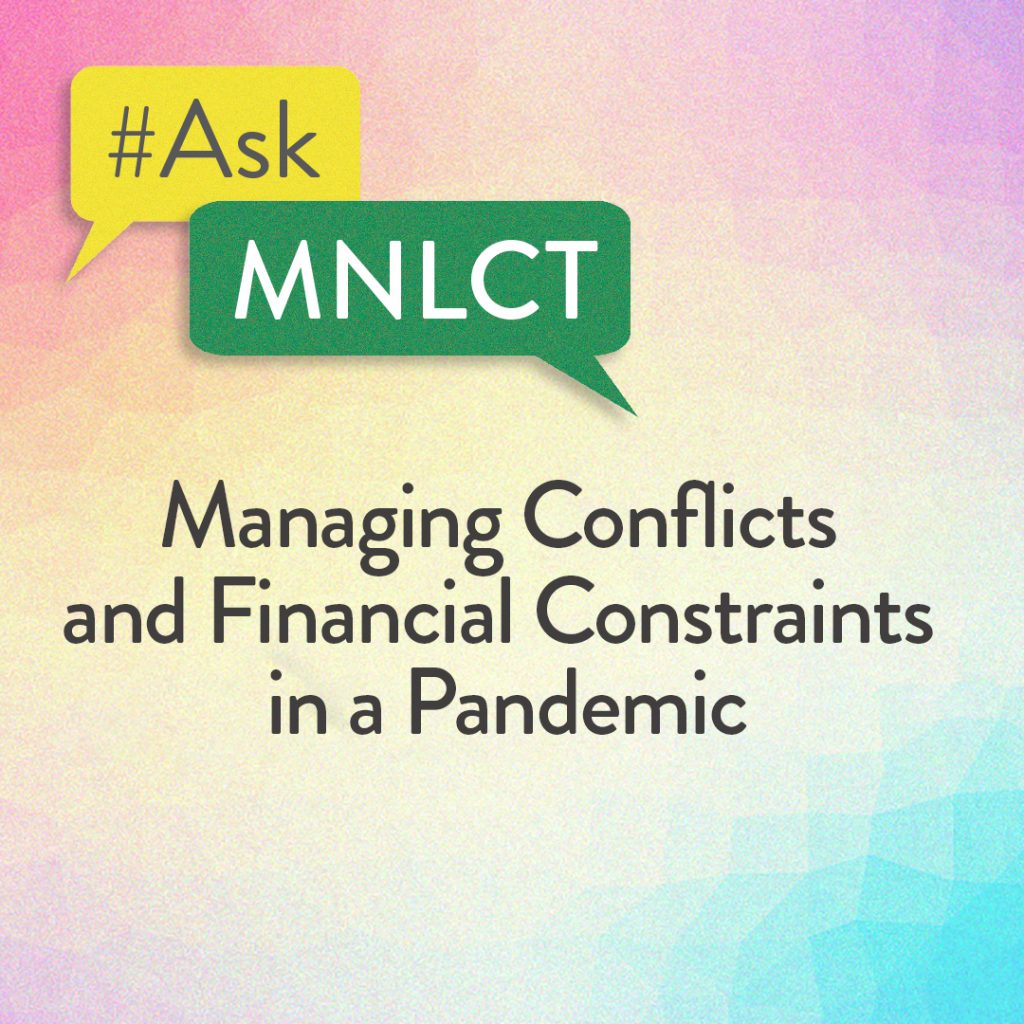Read answers to our clients’ more frequently asked questions, below, then join us on Thursday, May 21, 2020 at 1:00 PM, for a live online chat. Click here to register for the webinar chat to hear members of our Mental Health and Settlement Teams answer participants’ questions and have a chance to get YOUR questions answered too!
Do you have topic suggestions or questions you’d like answered in future editions? Send a note to our Communications Team: communications@mnlct.org.
Effective communication is key to maintaining a healthy relationship – be it with colleagues, friends or family members. Being confined to a small space for weeks on end – and especially during a period of stress and uncertainty due to a pandemic – can be frustrating.
This “quarantine effect”, that feeling of congestion, can easily make minor disagreements or negative feelings among family members worse, so it’s important to maintain calmness and convey your thoughts and messages clearly and with the utmost consideration to others.
Practicing effective communication is a great start, and it will help you realize others’ emotions and intentions. Listening is key and not only will it help make the other person feel heard and understood, it will also make you aware of how others perceive your actions.
To further reduce the development of any potential conflicts, it is important to have time alone to reflect on your thoughts, ambitions and situation – it will help you reconnect with yourself and maintain harmony within your home during quarantine.
You want to follow social distancing, not social isolation. While avoiding close contact with people who do not live with you is a fundamental measure in halting the spread of the COVID-19 virus, it is important to stay connected with family members, friends and coworkers.
If you are experiencing a feeling of hopelessness, remind yourself that this is not a permanent situation, and that things will change for the better. What we are experiencing now is something that is situational, and things will go back to normal or the “new normal”. Thinking this way will help you improve your sense of perception and see the light at the end of the tunnel.
Trying to focus on what you aspire to improve at the present moment will certainly help you achieve your life goals in the near future. Many newcomers, for instance, choose to study online courses to improve and develop new skills.
Adults must deal initially with their own feelings before they deal with their children’s.
First and foremost, parents must maintain their composure and remain calm. Aside from the anxiety of the pandemic state and the lockdown, taking care of others can add to feeling overwhelmed in this situation. As a parent or guardian, you must not let the interactions with those in your care, particularly kids, spiral out of control. Creating daily routines will make it easier to deal with disciplining, habits and limitations.
It is essential to team up with another adult and share responsibilities – taking a break from parenting will allow you to allocate time for yourself to recover your strength and energy.
You must understand that kids also are facing stress and they can reflect their emotions in different ways. What is called “negative” behavior in kids can be a sign of how they are feeling. Paying attention to what they are trying to say and realizing how the situation is affecting them will help you better understand how to deal with their anxieties. Difficult situations can turn into learning experiences for them, and will help them cope with challenges and stress now and in their future. Moreover, this is a unique opportunity to develop your relationship with your loved ones by spending more time with them while exploring and planning activities together.
Negative emotions during any crisis can be even more challenging to manage than normal times. In particular, anger and frustration can escalate to violence or abusive behaviour – resulting in the individual ending up in a deadlock.
The moment we realize we are angry and frustrated, it is important for us to breathe and stay calm however possible. Giving ourselves space and time to talk is crucial.
It can be useful to observe the situation and identify the distressing and negative thoughts that come to mind. If you ever experience such a situation, you want to ask meaningful questions:
- Are there facts to support those thoughts?
- Can you imagine the scenario from a different perspective?
- If this is happening to a friend, what you could say to them?
After all the probing, notice if the anger or frustration is reduced, which usually happens.
Given that depression consists of an internal conflict characterized by a negative vision – of the crisis, the world or the future – it is necessary to work on this by changing your perception. To change your viewpoint on a stressful situation, try to control your thoughts and emotions. You can register rationalizing aspects by asking questions like “What is the situation where those thoughts and emotions appear?” and “What could be an alternative positive option that can connect with affirmative thoughts and feelings?”. This will help you design an action plan to change your perception or vision of reality.
First of all, it is critical to recognize that it is normal to experience altered feelings, emotions and thoughts under the current circumstances. Try to notice the intensity and frequency of those feelings, emotions and thoughts, as well as how they are manifesting.
Second, you should discuss your feelings with people you know so they can alert you in case you are not noticing the problem. We should choose a trusted person with whom we feel comfortable and not judged.
Finally, if the discomfort continues, it is necessary to seek professional help. Our counsellors are ready to talk with you – give them a call at (647) 776-2057.
There is a one-time payment of GST/HST benefit for families if they have filed their income taxes for 2018. These payments are only one-time payments, and families and individuals have started receiving these payments as of April 9, 2020. The amount of GST/HST benefit will depend on the family’s net income for the year 2018.
Here’s what you get if you are eligible:
$443 to $886 if you are single
$580 to $1,160 if you are married or in a common-law relationship
$153 to $306 for each child under the age of 19 (excluding the first eligible child of a single parent)
$290 to $580 for the first eligible child of a single parent
For more information:
https://www.canada.ca/en/revenue-agency/services/child-family-benefits/covid-19- gsthstc-increase/covid-19-frequently-asked-questions-gsthstc-increase.html
The City of Toronto has implemented food access support and resources for seniors and vulnerable persons in the city. This is a partnership with community service agencies to connect with access points for food and to support in grocery shopping for those who are experiencing hardships related to COVID-19.
For more information, visit: https://www.toronto.ca/home/covid-19/covid-19-financial-social-support-for-people/covid-19-seniors-vulnerable-people/








